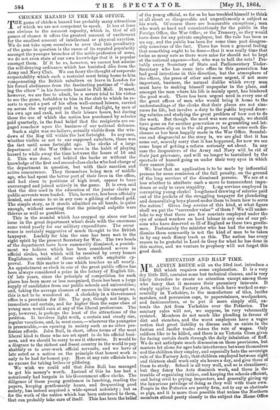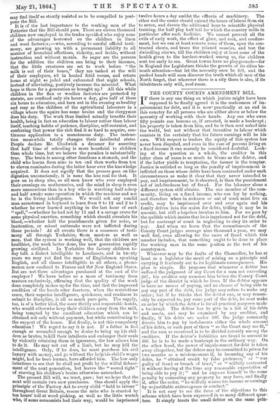EDUCATION AND HALF TIME.
MR. AUSTIN BRUCE will on the 23rd inst. introduce a Bill which requires some explanation. It is a very dry little Bill, contains none but technical clauses, and is very likely therefore to create no attention except among those who fancy that it menaces their pecuniary interests. It simply applies the Factory Acts, which have worked so suc- cessfully in Yorkshire, to the manufacture of tiles, lucifer matches, and percussion caps, to paperstainers, woolpackers, and fustiancutters, or to put it more simply still, - ex- tends the Act from Yorkshire over the Potteries. The sanitary rules will not, we suppose, be very vehemently resisted. Members do not much like pleading in favour of dirt and stenches, and the worst employers have a vague notion that great liability to disease such as exists in the- fustian and lucifer trades raises the rate of wages. Only soldiers like to be killed, and there is no Victoria Cross given for facing certain death through the daily inhalation of fluff. We do not anticipate much discussion on those provisions, but masters let alone for ages hate interference between themselves and the children they employ, and especially hate the sovereign rule of the Factory Acts, that children employed between eight and thirteen shall work only six hours a day, and give three of them to study. School is all very well, and so is cleanliness; but they fancy the Acts diminish work, and there is the trouble of organizing tuition, and keeping the schools efficient, and being civil to prying inspectors, and generally giving up the luxurious privilege of doing as they will with their own. People in the Potteries are pretty firm, not to say as obstinate as pigs, and it is more than possible that unless the Northern members attend pretty closely to the subject the Home Office may find itself so stoutly resisted as to be compelled to post- pone the Bill. It is of the last importance to the working men of the Potteries that the Bill should pass. There are eleven thousand children now employed in the trades specified who enjoy none of the advantages bestowed on the children in linen and wool factories ;—who, according to careful official testi- mony, are growing up with a permanent liability to all manner of bronchial affections, ricketty, and feeble, without instruction and without morals. So eager are the parents for the addition the children can bring to their incomes, that the little creatures are set to work before "the milk is out of their bones," they are tasked at the will of their employers, sit in heated fetid rooms, and return home at night so jaded and exhausted that night schools, instead of alleviating, positively increase the mischief. What hope is there for a generation so brought up ? All this while children in the flax or woollen factories are protected by statute, are confined only six hours a day, give half of those six hours to education, and turn out in the evening as healthy and rosy as the children of the agricultural labourers in a village where the squire has some brains and the clergyman does his duty. The work thus limited actually benefits their health, being in fact an education to labour rather than labour itself, teaching habits of patience, discipline, self-restraint, and conferring that power the rich find it so hard to acquire, con- tinuous application to a monotonous duty. The instruc- tion meanwhile totally changes their intellectal status. People declare Mr. Chadwick a dreamer for asserting that half time of schooling is more beneficial to children than whole time, but we believe the paradox is substantially true. The brain is among other functions a stomach, and the child who learns from nine to ten and then works from ten to eleven ruminates during the latter hour over the knowledge acquired. It does not signify that the process goes on like digestion unconsciously, it is none the less real for that. It goes on in sleep also, as all men know who ever employed their evenings on mathematics, and the mind in sleep is even more unconscious than in a boy who is watching half asleep and half awake some operation in which the machine and not he is the living intelligence. We would ask any candid man accustomed in boyhood to learn from 9 to 12 and 2 to 5 whether he ever learned anything in the last hour of each "spell,"—whether he had not by 11 and 4 a savage crave for some physical exertion, something which should circulate his blood,—whether half the punishments given for noise, or inattention, or school outbreaks were not inflicted during those periods? At all events there is a consensus of testi- mony all through Yorkshire, from masters as well as men, that the system is working well, that the children are healthier, the work better done, the new generation rapidly growing civilized. In Yorkshire the factory children to- day talk a dialect intelligible to Londoners, and in twenty years we may yet find the mass of Englishmen speaking English, and all classes intelligible to all others, a pheno- menon now confined to France and Ufa New England States. But are not these advantages purchased at the cost of the employer ? We have before us a mass of testimony from masters exclusively, affirming that the quality of the work done completely makes up for the time, and that the improved condition of the hands after fourteen, when the restrictions cease, their superior intelligence, quickness, and readiness to submit to discipline, is all so much pure gain. The supply, too, is of a better kind, the more thrifty and respectable hands, who would otherwise keep their children away from the mill, being tempted by the excellent education which can be obtained not only without payment, but while contributing to the support of the house. But finally, is not this compulsory education ? We regret to say it is not. If a father is fool enough or scoundrel enough to desire to bring up his chil- dren as brutes, to kill their intellects and endanger their souls by violently retaining them in ignorance, the law allows him to do it. He may not cut off a limb, but he may kill the intelligence. Only, if he does, he must purchase his evil luxury with money, and go without the help his child's wages might, had he been human, have afforded him. The law only interferes to see that he shall not profit by the wilful debase- ment of the next generation, but leaves the "sacred right" of starving his children's brains otherwise untouched. The present Bill will, we trust, pass ; but we hope that the next will contain two new provisions. One should apply the principle of the Factory Act to every child "held to labour" throughout Great Britain, rescue the mite who is stunted by ten hours' toil at weed-picking, as well as the little wretch who, if some economists had their way, would be imprisoned twelve hours a day amidst the effluvia of machinery. The other and the easier should extend the hours of labour from six to seven, and devote the additional hour to scientific physical training, the half play half toil for which the country mills in particular offer such facilities. We cannot prevent all the evils of early work, the effect of glare, and reek, and confine- ment, but we can at least remove some of thorn, open the con- tracted chests, and brace the relaxed muscles, and test the dwindling sinews, till the children enjoy at least some of the health given to the hardest-worked among us, the children sent too early to sea. Great towns have no playgrounds—for in England the Legislature thinks the growth of its cities be- neath attention—but let the necessity once be felt, and the packed hands will soon discover the truth which all men of the North forget, that wherever there is a city there is also, if its inhabitants only will, roof-room.































 Previous page
Previous page